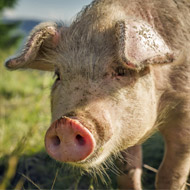Majority of European pigs tail-docked - study

The study found that
77 per cent of pigs in Europe are routinely tail-docked
77 per cent of pigs in Europe are routinely tail-docked
The majority of pigs in Europe are routinely tail-docked, despite it being against European legislation, a new study has found.
The research, carried out by the Federation of Veterinarians of Europe, found that on average 77 per cent of pigs in Europe are routinely tail-docked. Researchers say that to stop the practice, it is necessary for vets to raise awareness and provide more education about the risk factors.
‘The growing knowledge about the reasons for failing voluntary national initiatives as well as about successful measures taken by some countries to make pig production with intact tails feasible should be distributed throughout the EU pig producing community,’ the study concludes.
‘The veterinary profession has a significant role to play in raising awareness, facilitate knowledge transfer and to identify risk factors and solutions on farm level for the benefit of pig health and welfare.’
In the study, researchers assessed pig tail docking and the provision of enrichment across 24 European countries. They found that most pigs in Europe are being routinely tail docked, with the exception of Finland, Norway, Sweden and Switzerland, where less than five per cent of pigs are tail docked.
Researchers also found that 67 per cent of pigs across the 24 countries surveyed are given suitable enrichment materials.
'Training of veterinary practitioners, their role in advising the producer and undertaking a risk assessment of tail biting were more positively valued in countries that stopped routine tail docking than in countries that had not stopped routine tail docking,' the study said.
The researchers identified two initiatives that could promote the raising of pigs with entire tails, including training from national authorities and recording of tail biting at the slaughterhouse.
The study, ‘Phasing out pig tail docking in the EU - present state, challenges and possibilities’, is published in Porcine Health Management.



 The veterinary mental health charity Vetlife is inviting the veterinary community to join it for a sponsored cold-water dip.
The veterinary mental health charity Vetlife is inviting the veterinary community to join it for a sponsored cold-water dip.